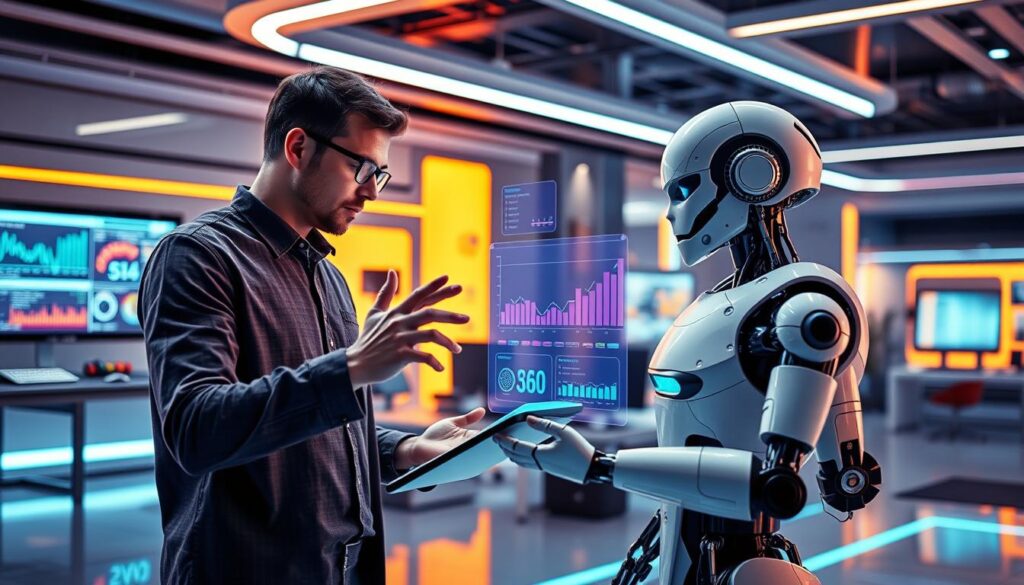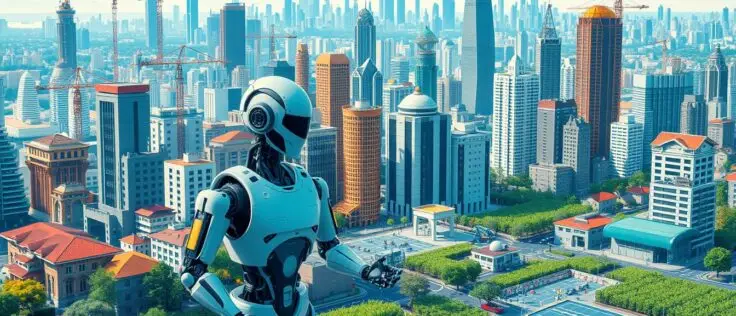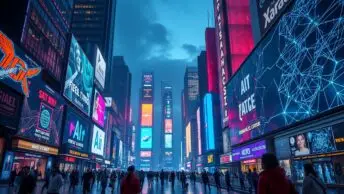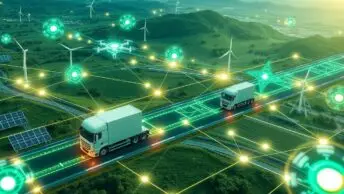As technology grows and changes our jobs, we wonder – will AI change or even remove jobs as we know them? AI could increase global economy by $13 trillion by 2030. This is about a 16% growth in cumulative GDP1. This has made the effect of AI on jobs and future work a big topic in economics. The McKinsey Global Institute says up to 70% of firms might use AI by 20301. This marks a big change in how we work. Yet, AI might take over 300 million full-time jobs worldwide1. Many studies show lots of jobs in Western countries could be automated1.
Looking at changes, we must ask which jobs will survive the digital shift and which won’t. According to McKinsey, and supported by Challenger, Gray & Christmas Inc., 60% to 70% of tasks could be automated. In fact, AI has already led to nearly 4000 job losses in May 20232. With advancements like GPT-42, from writing to translating, careers feel the AI effect. The key to coping is learning new skills. AI transformation leads to new job roles and better productivity, not just job loss2.
In the face of this tech wave, some areas remain untouched by AI. AI can do repetitive tasks, let marketers be more creative, and personalise projects3. But, AI can’t match human creativity or emotional smarts3. This shows we’re moving towards a future where AI helps, not replaces, human creativity.
The Current Landscape of AI and Human Jobs
AI technology in the job market has started big discussions. Studies, like those from McKinsey Global Institute, highlight a mixed effect. By 2030, up to 800 million jobs might be taken over by machines. Yet, it will also open new job chances in fields like healthcare, education, and tech4.
In some areas, the use of AI to do simple and repetitive tasks is growing. For example, in manufacturing, robots powered by AI are used not just to work faster. They also make workplaces safer by doing physically hard or dangerous jobs, which helps prevent injuries5. This trend is expanding to other sectors such as customer service and transport. Here, AI could replace jobs like customer help agents and lorry drivers6.
But, it’s not all about losing jobs. The job scene is changing as AI creates new roles. Roles that need solving complex problems and understanding emotions are being formed. While AI can read medical scans better, the health sector will grow. It’s making new jobs that use AI to give patients more tailored care54.
Putting money into education and training is essential now. Research shows we need to prepare workers and new talent. They must learn skills for hands-on roles and managing advanced AI. This is vital for keeping a job long-term and keeping our economy strong despite fast tech changes5.
The future relies on how fast AI grows and the smart choices of companies, educators, and policy makers. They must make sure people can succeed in a world where machines do more work.
Automation and Its Role in Job Displacement
The rise of automation in the workforce is changing jobs fast, sparking big worries about the effects on employment. As more AI technologies are used, especially in manufacturing, jobs are shifting. Now, about 12% of factories use AI, leading to big changes in labor7.
Economic Advancements Fueled by AI
Experts predict a huge jump in how much work AI can do, including tasks in the US and Europe. Jobs in manufacturing, services, retail, and construction are all seeing more AI, but it’s not just about making work easier. This could add $15.7 trillion to the global economy by 2030, showing the need for rules to balance income and wealth differences78.
The Realities of Job Substitution by Machines
More and more, machines are taking over jobs, making workers worldwide anxious. Some 30% think AI could replace them in three years. By 2030, up to 800 million jobs might be done by AI, changing what skills are needed8. Areas like retail and healthcare see benefits from AI like better ads and diagnoses. Yet, this also means some jobs get replaced and people need new training7.
As jobs change because of AI, it’s crucial to have plans to help everyone adapt. This means training for new skills, sharing wealth fairly, and closing the gap between skills and job needs. With careful planning and responsibility, we can manage the changes AI brings to work7.
The AI Impact on Specific Employment Sectors
AI is changing jobs in many industries. In manufacturing, jobs are being lost to automation. But in healthcare and education, jobs are growing and changing. Thanks to AI, medical workers can better diagnose and treat patients, lightening their load and improving care9.
The education sector might see more jobs too. These are roles where the human touch is still needed. AI helps but doesn’t replace educators. It safeguard from being replaced by AI. Together, healthcare and education show AI can create job opportunities. It’s expected to make 20 to 50 million new jobs worldwide by 20309.
CEOs around the world know they need to update their teams’ skills. About 69% say there’s a big need for skills in generative AI technologies10. This calls for a smart plan to use AI for good. The goal is to make the most out of AI without widening social gaps.
AI could add up to $4.4 trillion a year to the global economy. Its impact is huge, not just in tech but in shaping economic policies and business plans10. As a result, the job market is evolving. Success now means blending human skills with AI, readying for a future where they work closely together.
How AI Is Reshaping the Workforce Evolution
As we explore the impact of AI in the economy, we see its major changes. It’s not just changing, but fully changing the workforce. AI is creating jobs that need high skills in analytics and tech.
A Shift Towards High-Skilled Job Creation
The rise of AI is changing how we work in big ways, affecting HR and recruiting. It’s making jobs that need strong thinking skills more important. These are jobs that bring more value and require smart thinking. In finance and healthcare, AI is creating new innovations. It helps predict health costs and improves health plans, which leads to better financial and health results11.
Reshaping Roles with Human-AI Collaboration
Humans working with AI is changing how we work, making us more productive and improving our work lives. In healthcare, AI helps to make medicine more precise. This saves money and makes treatments more successful11. By doing simple tasks, AI lets us solve harder problems. It helps us plan and be creative12. AI is also used in planning for retirement. It predicts how long you’ll live and helps manage costs, but we also need to think about data safety and responsibilities11.
The way we work is changing fast because we rely on AI more and more. It helps us understand which employees might leave and how to keep them. Talent management needs to adapt to new skills and jobs. This means always learning and being able to change is key to doing well with AI at work1112. As we use AI more, keeping technology people-friendly is essential. This helps address ethical issues, making sure AI does good while taking care of the digital gap and improving fairness in the economy12.
The Crucial Importance of Skill Development and Reskilling
In today’s fast-changing work landscape, driven by advances in artificial intelligence (AI), focusing on skill development and reskilling is vital. These methods are key not only for keeping individual careers strong but also for ensuring that jobs last. Firms like Bank of America, Verizon, Accenture, and Amazon are leading the way, with Amazon’s Machine Learning University helping over 2,000 workers learn new skills13.
Reskilling programs can boost productivity by 6-12%. This shows they work well in creating a skilled and flexible workforce13. Being able to adjust to new technology and job needs is critical in today’s job scene.
Preparing Today for Tomorrow's Job Market
AI is expected to generate 20 to 50 million new jobs worldwide by 2030. This means the future job market will be quite different13. Positions like deep learning engineers are set to grow, especially in healthcare, finance, and tech sectors13. Getting ready for these changes means committing to ongoing learning and being ready to work, ensuring people have the tech and soft skills that AI can’t mimic.
The Role of Continuous Learning in Future Employment
Keeping up through continual learning is essential in staying relevant in a job market full of AI. Adopting a lifelong learning mindset, as highlighted at Scott Dylan’s blog, helps people adapt to new jobs and technological changes. Most people now see education as a never-ending process that helps them grow both intellectually and personally14.
This learning attitude helps create a culture where mistakes are part of learning. This is key to becoming more intelligent and adaptable, especially important in tech-focused workplaces of the future14.
Examining Employment Trends in the Age of AI
The entry of artificial intelligence (AI) into many fields is changing job market basics. This brings about a deep look into job trends and opportunities. We must grasp how these shifts will affect job growth and career paths in the AI era.
Prospects for Job Growth in the Tech-Driven Economy
AI is growing in different areas, making jobs in AI, big data, and automation more common. Studies show a big rise in hiring for these areas, with China seeing AI and big data jobs jump nearly 30%15. Yet, as AI spreads, regular jobs are adjusting. Some are growing slower, which points out we need big changes in skills and jobs16.
Analysing the Viability of Current Jobs in the Future Market
AI’s quick rise means we need to closely look at today’s jobs and their future. Fields like manufacturing are quickly adopting AI, upping the risk that some jobs might be replaced. This is especially true for older or less-trained workers15. But roles needing human touch or special skills seem to have a safer future. This shows how crucial it is to keep learning and adapting17. As jobs evolve, it’s essential to not just think about now but also prepare for the future by learning new skills15.
Understanding the Balance: AI Impact vs. Human Capital
The balance between AI and human skills is becoming very important for job dynamics and stable jobs. AI is getting more involved in businesses, making it key to focus on human skills that AI can’t mimic18. Skills like making important decisions, being creative, and understanding emotions are where humans excel.
Studies show that using AI for tasks such as hiring and assessing work can lessen basic workloads. This lets human resources work on tasks needing judgement and empathy19. This combination makes processes smoother and strengthens the human side in businesses, making employees feel valuable and unique.
Using AI for routine tasks is crucial; it also means workers need to learn new tech and methods. Getting the balance right means offering good training to upskill staff. This secures their jobs in an AI-focused future. For example, using AI for data analysis lets humans handle complex problems, showing off their strategic and creative skills19.
It’s essential to understand how AI and humans can work together at work. Firms should communicate well and support employees as they move to roles where AI helps instead of competing. This approach creates a team skilled in technology and rich in human qualities, encouraging innovation and ethical work18.
Focusing on these points means not just using technology but also committing to ethics, mental health, and wellbeing. AI’s role should promote a fair and supportive workplace where people and machines support each other.
Getting ready for AI’s impact by investing in human skills is key. This approach lets companies use AI to improve work while keeping jobs secure for their staff. Learn more about balancing tech growth and human skills in this detailed analysis on Europe’s AI legislative challenges18.
Strategies for Human-AI Collaboration in the Labour Market
Today’s labour market offers a chance to mix AI use and human skills in ways that improve jobs and productivity. By using AI, we can take on routine tasks automatically. This lets workers do more challenging and fulfilling work.

Enhancing Job Quality with AI Assistance
Using AI at work has really made job quality better. For example, when companies use AI to cut down on staff, they see quick boosts in productivity. But if AI’s used to help and increase human skills, the benefits last longer. AI can do the boring tasks. This allows people to focus on work that needs emotional intelligence, creativity, and good communication. Skills AI doesn’t have.
About 40% of jobs worldwide will change because of AI. This creates new chances in more modern workplaces20.
Leveraging AI for Improved Workplace Productivity
AI tech makes work productivity much better. Research by McKinsey shows AI creates new jobs and changes old ones20. AI helps manage data and automate office tasks. This leads to smoother operations and better decision-making. A study with 1,500 firms showed the biggest performance boosts happen when humans work with AI21. This partnership lets businesses run more smoothly and keep growing.
Conclusion
The world of work is changing fast because of artificial intelligence (AI) technology. This change brings up big questions about job security. It also makes it necessary for job strategies to adapt. Jobs in fields like transport, customer service, and manufacturing are at higher risk because of AI2223. So, people need to focus on areas where machines can’t replace them. Skills like leadership, being creative, and understanding emotions are key22.
While AI might take over some jobs, it also creates new ones. There’s a growing need for experts in machine learning, data science, and AI research22. The real task is to use AI to enhance what humans can do. This means jobs will focus more on continuous learning, improving skills, and being able to change24. Companies like Think Cloud show that using AI in cybersecurity and IT support helps businesses stay strong against online dangers24.
In the end, AI brings challenges but also new chances. Taking an active approach in the job market is crucial. Companies and workers need to value human talent and use AI in smart ways. This will help everyone cope with the digital world’s complexities. It ensures job safety and society’s progress in the future work scene2423. Merging human with artificial intelligence is key to securing a top spot in the changing world economy.
FAQ
How is AI expected to impact the future of work?
AI is set to change work by bringing new opportunities and challenges. It will speed up economic growth and boost productivity. New jobs needing digital know-how will appear. But, job loss is feared as AI does routine tasks, pushing people to learn AI skills for new roles.
Which sectors are most vulnerable to job substitution due to AI advancements?
Jobs with repetitive tasks, like in manufacturing, customer service, and data entry, may be replaced by AI. However, jobs needing creative thinking and human touch stand a better chance against AI.
What roles might see an increase due to AI’s influence?
With AI, there’ll be more demand for tech-savvy jobs. This includes AI development, data analysis, and jobs needing digital skills. Critical thinking and tech knowledge will be valued.
How can individuals prepare for the changing job landscape due to AI?
To keep up, focus on learning new skills and upgrading current ones. Lifelong learning in digital fields and AI is key. Embrace new tools and blend technical skills with soft skills to stay relevant.
Will AI replace humans in jobs, or will it create new job opportunities?
AI will take over some tasks but also create jobs needing humans and AI to work together. Creativity, emotional intelligence, and managing relationships are skills that will remain in demand. These jobs will grow with AI.
How will AI impact workforce dynamics and the value of human capital?
AI will make the workforce more productive by automating simple tasks. This enhances human traits AI can’t mimic like creativity and ethical judgements. There’s a need to rethink job roles and appreciate human qualities more.
Can AI improve the quality of work for human employees?
Yes, AI can make work better by doing routine tasks. This leaves humans to tackle complex problems, increasing job satisfaction and output.
What strategies are there for effective human-AI collaboration in the workplace?
Successful human-AI teamwork means figuring out what AI can do better, freeing humans for strategic tasks. Training people to work with AI is key, as is nurturing soft and innovative skills.
How crucial is adaptability in the face of AI-induced job market changes?
Being adaptable is vital to cope with AI’s effects on jobs. Ready to learn and change, individuals and firms can prosper. Stay updated and proactive to secure your place in the future job market.
Source Links
- You would have been living under a rock if you did not know how artificial intelligence is set to affect jobs in 2024-2030. AI like ChatGPT seems to be stealing all of the headlines at the moment, Google unveiled new AI software to build presentations, analyze and enter data, and write content, and – https://www.nexford.edu/insights/how-will-ai-affect-jobs
- Will AI Replace Jobs? 9 Job Types That Might be Affected – https://www.techtarget.com/whatis/feature/Will-AI-replace-jobs-9-job-types-that-might-be-affected
- Why Artificial Intelligence Won’t Replace Marketing Jobs – https://www.pareto.co.uk/blog-details/why-artificial-intelligence-won-t-replace-marketing-jobs/
- The Shifting Landscape AI and Employment Trends in the Modern Workforce – https://www.linkedin.com/pulse/shifting-landscape-ai-employment-trends-modern-workforce-bajaj-lwh0c
- AI And Jobs: The Good And Bad News – https://www.forbes.com/sites/bernardmarr/2024/05/29/ai-and-jobs-the-good-and-bad-news/
- What Jobs Will AI Replace? | Built In – https://builtin.com/artificial-intelligence/ai-replacing-jobs-creating-jobs
- The Job Displacement Dilemma: How AI automation threatens traditional employment – Linvelo – https://linvelo.com/the-job-displacement-dilemma/
- AI Replacing Jobs Statistics: The Impact on Employment in 2024 – https://seo.ai/blog/ai-replacing-jobs-statistics
- Innopharma Education Blog – https://www.innopharmaeducation.com/our-blog/the-impact-of-ai-on-job-roles-workforce-and-employment-what-you-need-to-know
- PDF – https://www.ioe-emp.org/index.php?eID=dumpFile&t=f&f=160463&token=8a7078c15874881a559cd18ae85a0b9283afd5db
- How Artificial Intelligence is Transforming Human Resources and the Workforce – https://www.aon.com/en/insights/articles/how-artificial-intelligence-is-transforming-human-resources-and-the-workforce
- The Synergy Of Humans And AI Is Reshaping The Workforce For The Future – https://www.forbes.com/sites/neilsahota/2024/07/19/the-synergy-of-humans-and-ai-is-reshaping-the-workforce-for-the-future/
- The Future of Work: Reskilling and Upskilling for the AI-Driven Workforce – https://www.linkedin.com/pulse/future-work-reskilling-upskilling-ai-driven-workforce-kambhampati-hhpre
- Navigating the AI skills gap with upskilling and reskilling | The CPD Certification Service – https://cpduk.co.uk/news/navigating-the-ai-skills-gap-with-upskilling-and-reskilling
- The impact of artificial intelligence on employment: the role of virtual agglomeration – Humanities and Social Sciences Communications – https://www.nature.com/articles/s41599-024-02647-9
- AI Jobs Barometer – https://www.pwc.com/gx/en/issues/artificial-intelligence/ai-jobs-barometer.html
- PDF – https://www.whitehouse.gov/wp-content/uploads/2022/12/TTC-EC-CEA-AI-Report-12052022-1.pdf
- How AI Will Impact Human Capital in the Technology, Media and Communications Industry – https://www.aon.com/en/insights/articles/how-ai-will-impact-human-capital-in-the-technology
- The Human Touch in an AI-Driven World: Balancing HR and Technology in Human Resources Management – https://mitratech.com/resource-hub/blog/the-human-touch-in-an-ai-driven-world-balancing-hr-and-technology-in-human-resources-management/
- SAP BrandVoice: Embracing The Power Of Human And AI Collaboration To Create New Opportunities – https://www.forbes.com/sites/sap/2024/09/10/embracing-the-power-of-human-ai-collaboration-in-cloud-erp/
- How Humans and AI Are Working Together in 1,500 Companies – https://hbr.org/2018/07/collaborative-intelligence-humans-and-ai-are-joining-forces
- Council Post: How Does Artificial Intelligence Create New Jobs? – https://www.forbes.com/councils/forbesbusinesscouncil/2023/07/26/how-does-artificial-intelligence-create-new-jobs/
- The Impact of Artificial Intelligence – Widespread Job Losses – https://www.iotforall.com/impact-of-artificial-intelligence-job-losses
- Human weakness 21 jobs Artificial Intelligence is replacing – https://www.think-cloud.co.uk/blog/is-artificial-intelligence-making-you-obsolete-21-jobs-ai-is-replacing/






